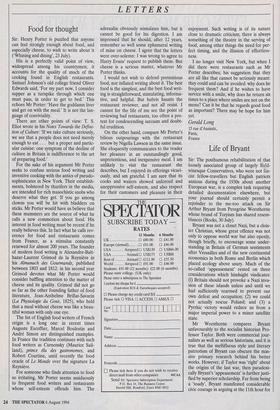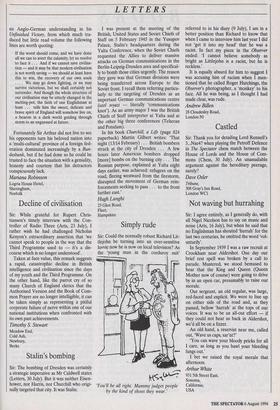Life of Bryant
Sir: The posthumous rehabilitation of that loosely associated group of largely Bald- winesque Conservatives, who were not fas- cist fellow-travellers but English patriots anxious during the 1930s about another European war, is a complex task requiring detailed documentation elsewhere, but your journal should certainly permit a rejoinder to the me-too attack on Sir Arthur Bryant from Peregrine Worsthorne whose brand of Toryism has shared resem- blances (Books, 30 July).
Bryant was not a closet Nazi, but a clois- ter Christian, whose great offence was not only to oppose world war but also openly, though briefly, to encourage some under- standing in Britain of German sentiments after Versailles and of the new continental economics in both Rome and Berlin which placed ecology above usury. Much of the so-called 'appeasement' rested on three considerations which hindsight vindicates: (1) Britain should not provoke a Nazi inva- sion of these islands unless and until we had sufficiently rearmed to prevent our own defeat and occupation; (2) we could not actually rescue Poland; and (3) a Pyrrhic victory would reduce us from a major imperial power to a minor satellite state.
Mr Worsthorne compares Bryant unfavourably to the socialist historian Pro- fessor Taylor. Both were commercial jour- nalists as well as serious historians, and it is true that the mellifluous style and literary patriotism of Bryant can obscure the mas- sive primary research behind his better works. However, if Taylor was 'right' about the origins of the last war, then paradoxi- cally Bryant's 'appeasement' is further justi- fied by superior scholarship. Far from being a 'toady', Bryant manifested considerable civic courage in arguing at the 11th hour for
LETTERS
an Anglo-German understanding in his Unfinished Victory, from which much tra- duced but little read volume the following lines are worth quoting: If the worst should come, and we have done all we can to avert the calamity, let us resolve to face it . . . And if we cannot save civilisa- tion — and it may be that modern civilisation is not worth saving — we should at least have this to win, the recovery of our own souls . . . . We may go down fighting, or we may survive victorious, but we shall certainly not surrender. And though the whole structure of our civilisation may be utterly changed in the melting-pot, the faith of one Englishman at least . . . tells him the sweet, delicate and brave spirit of England will somehow live on, a beacon in a dark world guiding through storm to an unguessed at future.
Fortunately Sir Arthur did not live to see his opponents turn his beloved nation into a 'multi-cultural' province of a foreign fed- eration dominated increasingly by a Bun- desbank, but if he had done so he could be trusted to face the situation with a geniality, honesty and courtesy that his detractors conspicuously lack.
Mariana Robinson
Logria House Hotel, Sheringham, Norfolk



















































 Previous page
Previous page